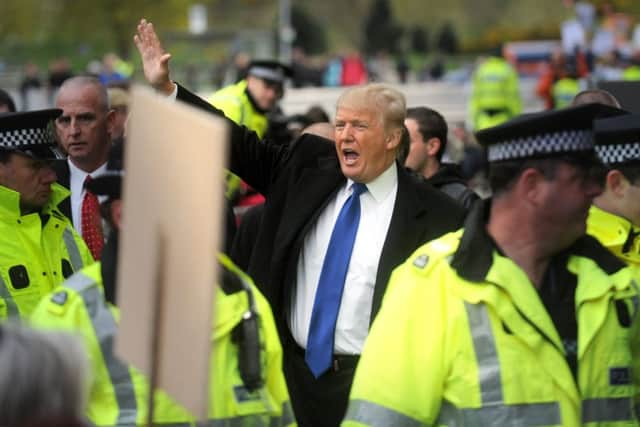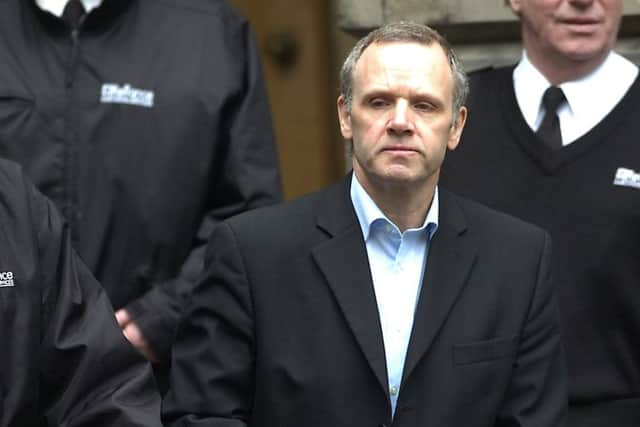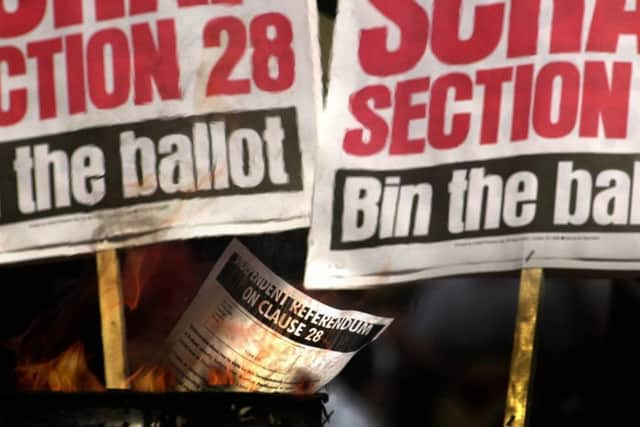Scottish Parliament at 20: Notable events from two incident-packed decades
TRUMP AT PARLIAMENT
“I am the evidence,” boomed Donald Trump during a memorable appearance before MSPs. This was five years before the tycoon was to win the US Presidency but all the bombast and sweeping rhetoric that propelled him to the White House was on display as he appeared before Holyrood’s economy committee. Trump was angry about plans for an offshore windfarm adjacent to his golf resort in Aberdeenshire. His appearance provoked rival demonstrations outside Holyrood. Environmental campaigners, opposed to his North-east project, awaited his departure. But Trump’s keen eye for a photo opportunity saw him make a beeline towards a separate anti-windfarm protest and ensure this was the image which accompanied much of the coverage.
PRISON FOR MIKE WATSON


One of the strangest incidents in the two decades of devolution came when the Labour MSP Mike Watson was jailed for fireraising after appearing to attempt to set light to curtains at Edinburgh’s Prestonfield hotel at the annual Politician of the Year awards in 2004. At that point Watson, who previously served as an MP, had been appointed to the Lords and then entered Holyrood where he served as a tourism minister under Jack McConnell, before losing office in a reshuffle. The incident was all the more bizarre as it had been captured on CCTV. Watson eventually pleaded guilty but offered no explanation for his behaviour and was jailed for 16 months, but served half of this. He continues to sit in the Lords as Baron Watson of Invergowrie.
THE SHERIDAN TRIAL
Advertisement
Hide AdAdvertisement
Hide AdThe Scottish Socialist party was a significant force in the early years of devolution, returning six MSPs in 2003. That would end with the incredible defamation case which would engulf its leader Tommy Sheridan in 2006. He sued the now defunct News of the World over claims it made about his private life and disputed claims in court that he visited swingers clubs. The then Glasgow MSP would claim a dramatic victory, winning a £200,000 payout from the publisher. But it would tear his party apart, with most of his MSP colleagues testifying that Sheridan had admitted visiting a swinger’s club at a party meeting. The infighting saw the socialists wiped out in the 2007 Holyrood election and they’ve not been back since. Victory also proved short-lived for Sheridan who was jailed for three years in 2010 for perjury over the evidence he gave in the civil case. However, he was allowed to keep his £200,000 damages– and even awarded £176,000 interest after a ruling last year.


DONALD DEWAR’S DEATH
Donald Dewar was more than anyone the founding father of devolution and his sudden death just a year after the Parliament was established came as a shattering blow. Dewar was Scotland’s inaugural First Minister and instrumental in drawing up the Scotland Act and the sweeping array of powers it delivered to Holyrood. Ill-health had forced him to take three months off in mid-2000 in order to get surgery on a leaking heart valve. But many close friends and colleagues, including Gordon Brown, feel that he returned to work too soon and pushed himself too hard when he did. On the day he died, Dewar fell from the steps of his official Edinburgh residence, Bute House, after a morning Cabinet meeting, but continued to conduct meetings into the afternoon. It was only later that the gravity of his condition became clear and it was the following day that David Whitton, Mr Dewar’s spokesman, announced his death to the nation.
BUDGET FALLS
The only time a budget has ever been rejected at the Scottish Parliament was when the inaugural SNP Government had its £33 billion spending plans rejected in a knife-edge vote in 2009. It was actually tied as the SNP and Tories voted together against Labour, the Liberal Democrats and Greens resulting in 64-64 tie which resulted in the Presiding Officer Alex Fergusson following convention and backing the “status Quo” which meant the previous year’s budget stood. Salmond was furious and let it be known he was ready to call a snap election if his plans weren’t approved.


“The government cannot stay in office unless we can get a Budget through,” he said.
Opponents said they had been angered by the tawdry manner with which they had been treated by SNP ministers throughout the process. But the crisis proved short-lived and a revised budget was brought back a week later, with Labour and the Lib Dems on board after concessions on apprenticeships.
THE ROOF FALLS IN
Just when the fledgling Parliament thought it had weathered all the flak about its £414 million construction costs – the roof fell in. Well not quite, but the main debating chamber was shut for business in March 2006 when a 12ft wooden roof beam swung loose above the Tory benches, prompting fresh questions about the building. Alternative venues were looked at, but in the end MSPs were only evicted to one of the bigger committee rooms at Holyrood for full debates of the Parliament – even though they couldn’t all fit in. The eviction lasted two months while a temporary solution was put in place which saw abseilers installing yellow straps around the ends of all the struts in the complex chamber roof. A temporary repair was carried out the following summer.


MARGO’S RIGHT TO DIE SPEECH
The independent MSP Margo MacDonald sent shockwaves around Parliament and wider Scottish public life when she announced that she wished for the right to take her own if life if her condition deteriorated to the point where it became unbearable. It came during a seemingly innocuous members’ debate on end of life choices in March 2008. “I apologise for being personal in this, but it’s not a theory with me,” she said.
It thrust the Assisted Suicide issue to the centre of the political agenda in Scotland and led to unsuccessful attempts to change the law in Scotland spearheaded by MacDonald who eventually passed away in 2014. But the campaign continues with a new generation of MSPs backing the introduction of assisted suicide.
SECTION 28
Advertisement
Hide AdAdvertisement
Hide AdHolyrood’s first taste of vitriolic public backlash came when the inaugural Labour/Liberal Democrat administration announced plans to repeal the ban which Margaret Thatcher had imposed more than a decade earlier on promoting the acceptability of homosexuality in schools. Known as Section 28, it was to split the country after religious groups mobilised against it. Cardinal Thomas Winning, the leader of Scotland’s Roman Catholics, led the criticism and Stagecoach tycoon Brian Souter bankrolled the Keep the Clause Campaign. It dominated the parliament’s first year and an informal ballot organised by opponents saw 1 million Scots vote against repeal. The section was eventually repealed but only after the then Executive bowed to pressure and included marriage in new guidance on sex education.
WINNIE EWING “RECONVENES” PARLIAMENT
Devolution may be 20 years old but the Scottish Parliament has a history stretching back centuries prior to the 1707 Act of Union. And so it was that when Nationalist stalwart Winnie Ewing formally declared the Parliament open on May 12 1999, she used the moment to give a nod to the past as she addressed MSPs on the Mound.
“I want to start with the words that I have always wanted either to say or to hear someone else say,” the 79-year-old said.
“The Scottish Parliament, which adjourned on March 25, 1707, is hereby reconvened.”
Nicola Sturgeon who in the chamber, has since described it as an “incredibly emotional moment.”
JACK McCONNELL’S PINSTRIPE KILT
The most glaring “fashion faux pas” in the two decades of devolution came in 2004 when First Minister Jack McConnell ditched convention at the 2014 Tartan Day celebrations in New York. McConnell arrived in a sporran-free black woollen 21st-century kilt, designed by Howie Nicholsby, complete with white pinstripe. On top, the traditional formal shirt and Prince Charlie jacket were replaced with a white dress-down ghillie shirt.
Traditionalists found it hard to hard to understand why the country’s most senior politician had opted not to wear tartan on Tartan Day – while other guests like Sir Sean Connery opted for the traditional Highland dress.
McConnell has since admitted that photographs of the evening have since come to haunt him.
